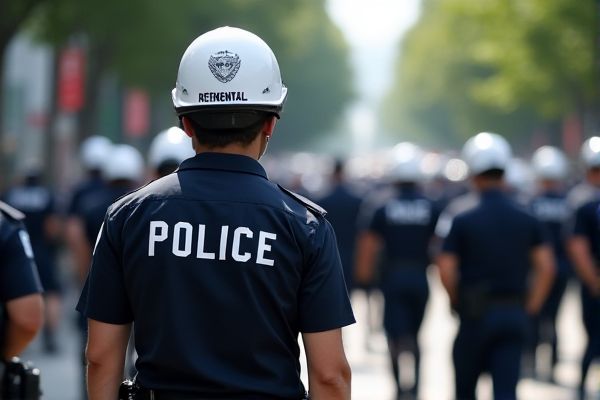
The Philippines offers various job opportunities for police officers, particularly through the Philippine National Police (PNP) which recruits candidates regularly. Aspiring applicants typically need to meet educational qualifications, often requiring at least a bachelor's degree in criminology or a related field. Competitive salaries and additional benefits, such as housing allowances and health care, are provided to police personnel, fostering career advancement and stability. Continuous training programs and community engagement initiatives further enhance the professional development of officers, promoting effective law enforcement practices.
Job Description
Police jobs in the Philippines involve maintaining peace and order, enforcing laws, and preventing crime within communities. Responsibilities include conducting investigations, managing emergency situations, and collaborating with local government units to address public safety concerns. Officers often engage in community outreach programs to foster trust and cooperation between the police and residents. Opportunities for career advancement may include specialized training in areas such as forensics, cybercrime, or counter-terrorism.
Requirement
Police jobs in the Philippines require applicants to meet specific qualifications, including a minimum height requirement of 5 feet for males and 5 feet 2 inches for females. Candidates must also possess a bachelor's degree from a recognized institution, with degrees in criminology or related fields being preferred. Medical and psychological assessments are mandatory, ensuring that individuals are fit for the demanding nature of police work. Background checks are conducted to ensure candidates have no criminal records, emphasizing the importance of integrity in serving the community.
Salary and Perks Expected
In the Philippines, police jobs offer competitive salaries that typically range from 29,000 to 60,000 PHP per month, depending on rank and experience. Alongside a regular salary, officers often receive various perks, such as hazard pay, allowances for clothing, and other operational expenses, enhancing their overall compensation package. Opportunities for advancement in the police force are available, allowing you to increase earning potential through promotions and specialized training programs. Job security and a sense of duty to the community also make a career in law enforcement a respected choice in Philippine society.
Similar Job Names
- Police Officer
- Police Lieutenant
- Police Captain
- Police Major
- Police Colonel
- Police Director
- Criminal Investigator
- Forensic Analyst
- Traffic Management Officer
- Public Safety Officer
- Intelligence Officer
- Community Relations Officer
- Patrol Officer
- Special Weapons and Tactics (SWAT) Officer
- Cybercrime Investigator
- Narcotics Officer
- Anti-Drug Enforcement Officer
- Regional Director
- Chief of Police
- Desk Officer
Job Expectation Concept
In the Philippines, police jobs encompass a variety of roles aimed at maintaining peace and order, preventing crime, and enforcing laws. Officers are expected to engage actively with their communities, promote public safety, and uphold human rights within their duties. The Philippine National Police (PNP) emphasizes transparency and accountability in its operations, reflecting the country's commitment to reform and modernization in law enforcement. You may find that ongoing training and community outreach programs play a crucial role in developing the skills necessary for effective policing in this context.
Career Advantage and Weakness
Police jobs in the Philippines offer a unique career advantage through job security, as these positions are typically permanent and come with government benefits. Moreover, those in law enforcement can gain a sense of fulfillment from serving their communities and contributing to public safety. However, the profession also presents inherent weaknesses, including exposure to dangerous situations and the potential for high-stress environments. Your workload may also be affected by bureaucracy and resource limitations, which can impact overall job satisfaction.
Important Thing Must Know
Police jobs in the Philippines require a strong commitment to public safety and community service. Applicants often undergo rigorous physical, mental, and psychological examinations to ensure readiness for the demands of the job. Training at the Philippine National Police Academy (PNPA) or other accredited institutions equips you with essential skills in law enforcement and community relations. Opportunities for specialization exist in areas such as criminal investigation, community policing, and traffic management, allowing for career growth. The role demands a high level of integrity, discipline, and respect for human rights, crucial for maintaining public trust and promoting safety in communities across the nation.
Alternative Career Options
Exploring alternative career options after serving in police jobs in the Philippines can lead to fulfilling opportunities in various sectors. You may consider roles in private security, where your experience in law enforcement is highly valued. Jobs in community relations or local government can also benefit from your skills in conflict resolution and public safety. Other options include working in non-governmental organizations (NGOs) focused on crime prevention, advocacy, or youth programs, allowing you to make a positive impact in the community.
Companies List
- Philippine National Police (PNP)
- Bureau of Jail Management and Penology (BJMP)
- Department of Justice (DOJ)
- National Bureau of Investigation (NBI)
- Philippine Drug Enforcement Agency (PDEA)
- Local Government Units (LGUs)
- Security agencies and private security firms
- Government law enforcement agencies
- Research and private investigation firms
- Non-governmental organizations (NGOs) focusing on law enforcement
List of Ideal City
Manila offers numerous opportunities for police officers, given its status as the capital city, which requires a strong law enforcement presence. Cebu, known for its growing urbanization and tourism industry, presents diverse roles and challenges for police work. Davao City stands out for its strict security measures and community policing initiatives, fostering a safer environment. Consider the unique aspects of each city to find the best fit for your career in law enforcement in the Philippines.
 jobs-philippines.com
jobs-philippines.com